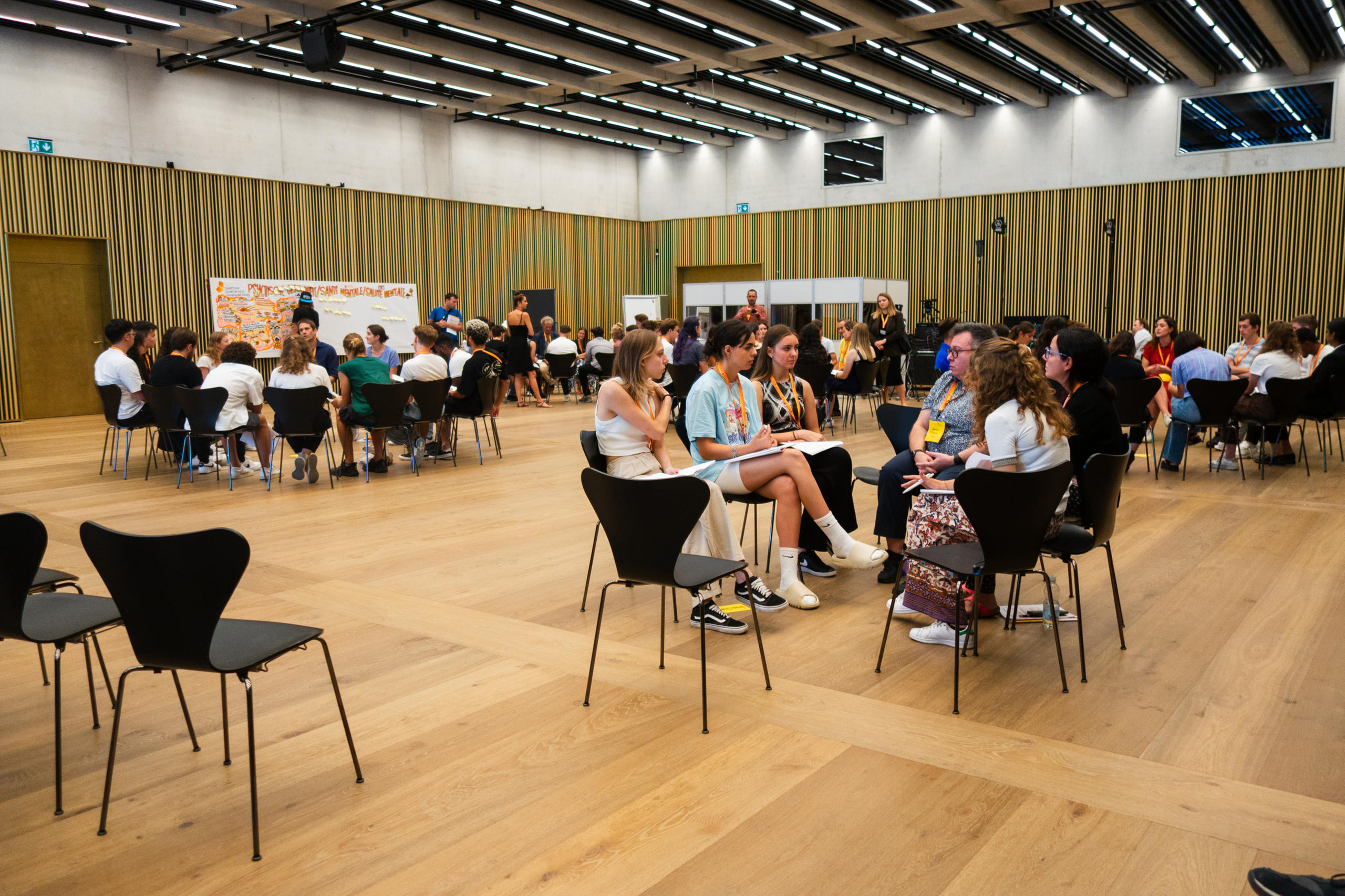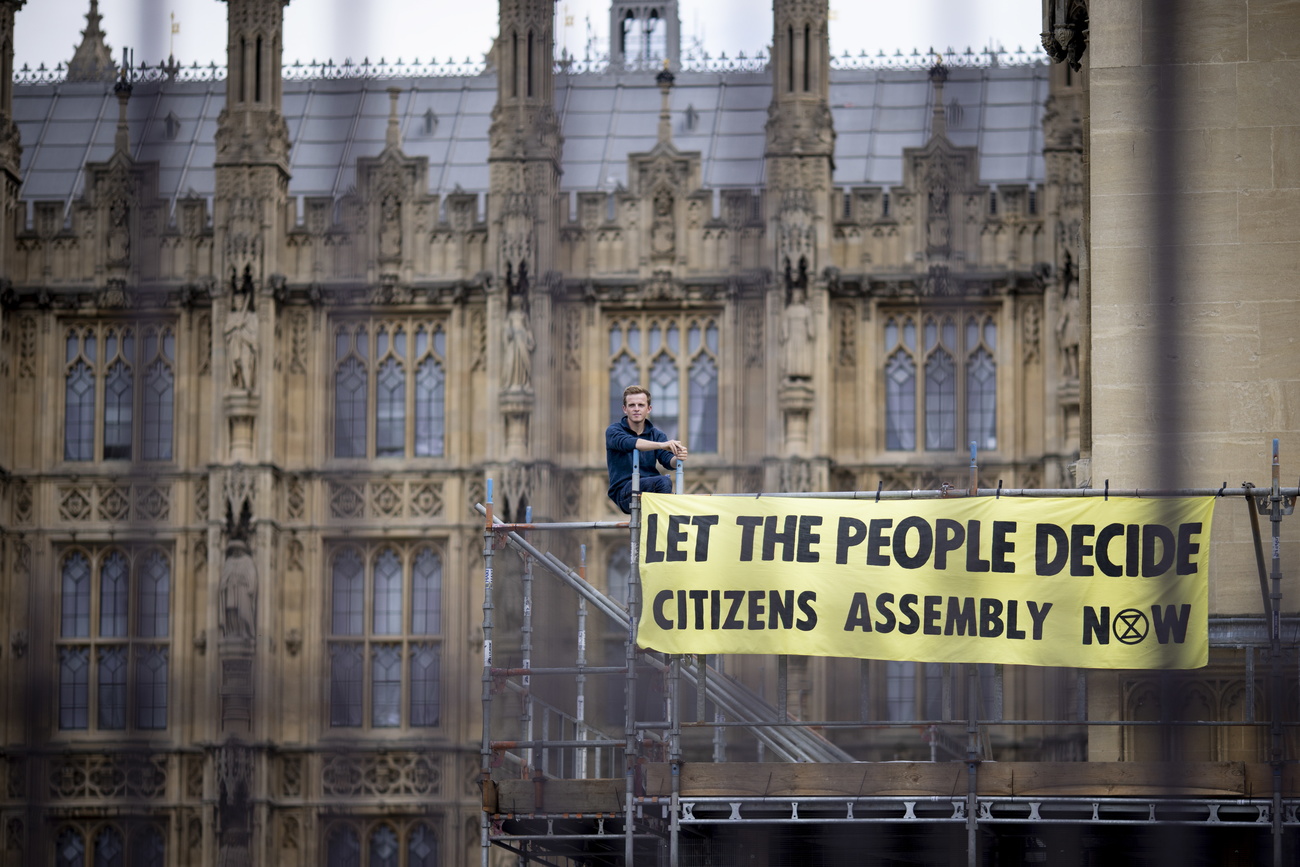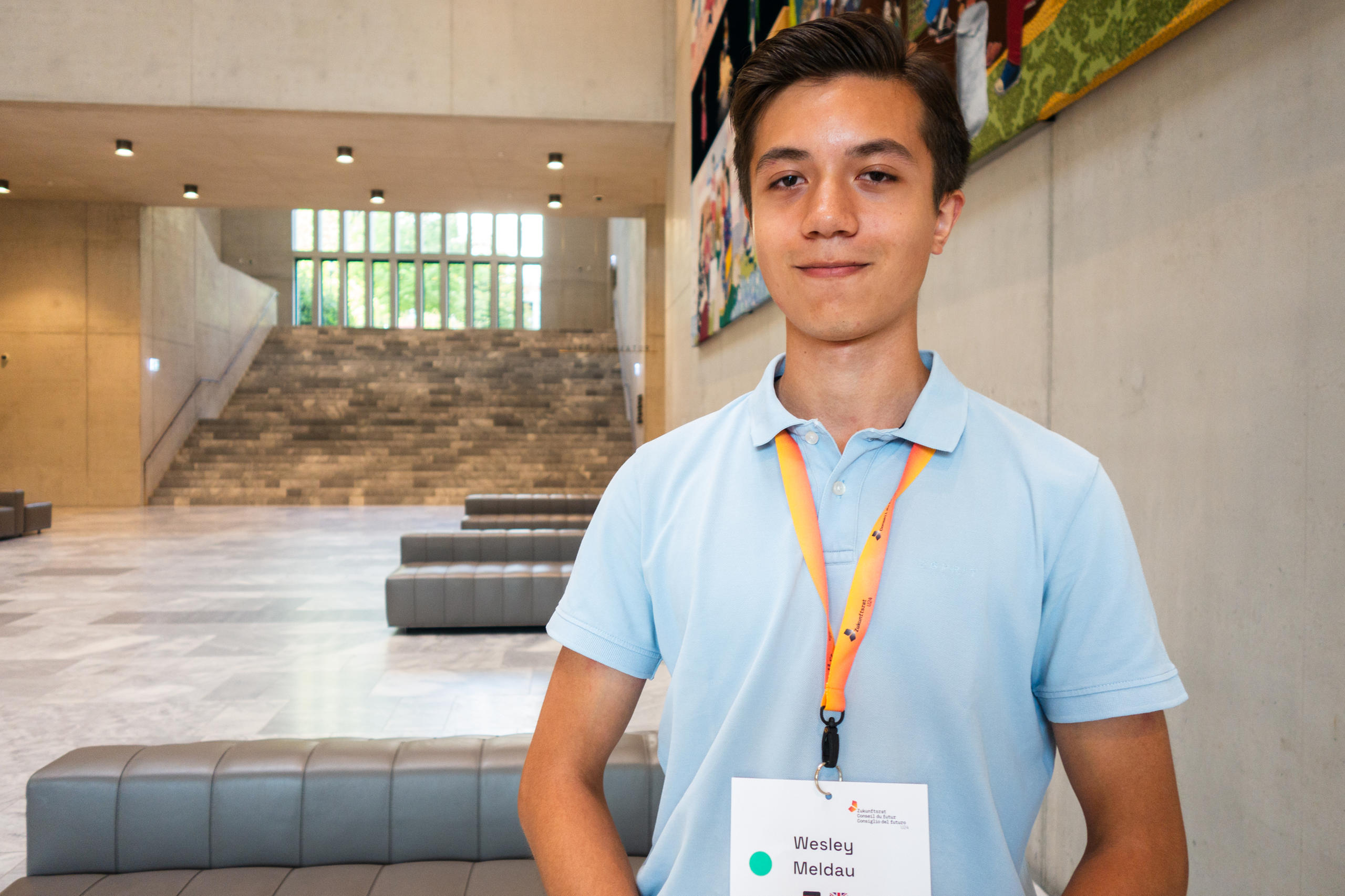
Swiss youth seek ways out of mental health crisis

At the Under-24 Council of the Future, 80 young people from across Switzerland are working out political proposals on improving mental health. Participants were chosen by lot. Now they are hoping to influence official politics.
If there had been a council of the future in his young days, it would not have concerned itself with mental health. This is the comment of the grey-haired expert to whom young people between 16 and 24 ask their questions. But one can see from the faces of the participants that they are fully aware of the responsibility they are taking on here.
At the end of November 2023, the Council of the Future presented its proposals to the public. First and foremost is the call for more prevention in the mental health sector. It also wants a national law to regulate social media platforms. This should include youth-friendly versions of all platforms and effective control of age limits. The Council of the Future is also calling for platforms to take more responsibility for the content they host.
The young adults’ committee also wants a new school subject called “Psychology and personal development”. In the world of work, it wants stronger protection against discrimination for mentally ill people, as well as clear rules on when to answer emails outside of working hours, for example.
The intensively discussed proposal of a general four-day working week did not receive the necessary majority in the Council of the Future.
Annabel Lewis from Geneva voted for the mental health focus. “I knew that mental illness affects young people – but the figures we are seeing are thought-provoking,” she says. One out of five people is affected by mental illness. That means every Swiss young person likely has a peer who is struggling psychologically.
The Under-24 Council of the Future is meeting this autumn for one weekend each in Zurich, Lausanne and Locarno. They hear information briefings, they discuss, and at the end they formulate their suggestions to the political level as to how Switzerland can better deal with the issue of mental health.

The Council of the Future is a citizen assembly or panel. This is nothing new either in Switzerland or elsewhere in the world. In recent years such groups have emerged as a trend in the development of democracy.
Climate councils and citizen panels
The trend began in Europe with the Irish citizen assembly We The Citizens. The Irish citizens chosen by lot were to come up with positions on polarising issues through a discussion process, called deliberation. Surprising for many, one of the recommendations of this Irish panel was for a liberal abortion law – and in 2018, in the traditionally Catholic country, almost two thirds voted in favour. Up till then in Ireland there had been no movement on the issue of abortion for a long time.
After the Irish citizen assembly had thus got the country out of one political cul-de-sac, there emerged further such panels chosen by lot, including national climate change councils in France, Germany, and Britain.

More
What role can citizens’ assemblies play in solving the climate crisis?
Councils of citizens often find themselves dealing with climate change issues. NGOs and activists like Extinction Rebellion have been calling for these councils to be involved in decision-making on climate change policy. The three citizen councils most recently organised in Switzerland – in the municipalities of Winterthur, Uster and Thalwil – dealt with sustainability and climate policy.
On the other hand, the Council of the Future, whose members belong to the same generation as Greta Thunberg, has taken up a different topic which was not a major political issue until now: mental health.
This was decided by a representative survey of 20,000 young adults around Switzerland. Over 40% voted to focus on mental health. In second place, with 20%, came sustainability.
In all, 20,000 of the 800,000 people in Switzerland between 16 and 24 received an invitation. Of these, 1200 indicated their interest in the Council of the Future. The council members were chosen by lot from this pool in a manner representative of the population groups men, women, French Switzerland, Ticino and German Switzerland, with or without Swiss citizenship. In order that there be no financial barrier to involvement, the participants receive a daily allowance equivalent to those on Swiss military and alternative service, at least CHF69 per day.
The Under-24 Council of the Future project is run by the Swiss UNESCO Commission together with the Swiss Society for the Common Good, which (among other things) manages the Rütli, the site where, according to hallowed myth, the Swiss confederation began. The project enjoys broad support ranging from the federal government to Switzerland’s national broadcaster (to which SWI swissinfo.ch belongs).
The steering committee of the Under-24 Council of the Future includes members of all parties, or almost – only the seat for the right-wing conservative Swiss People’s Party is still vacant. Co-project-leader Che Wagner is optimistic that this will soon be resolved, as they are in contact with potentially interested representatives of the party.
Seventeen year-old Lewis from Geneva voted for the mental health focus. The Council of the Future member does not see herself really as a political person. She saw the call to join the Council of the Future as an opportunity to get to know Swiss politics more deeply. Lewis has not made up her mind and is open to considering all suggestions that come up. She feels that mental health as a topic should get more exposure in the school system.

“In school, mental health has not been an issue so far, which is why people of all ages find it hard to talk about,” says Lewis. “Yet mental health should not be a taboo topic and I would favour it being more talked about in the school environment. Those affected would then be freed of stigma and be more likely to seek out therapy resources.”
Lewis believes that Switzerland should spend more money on this – increasing therapy resources and making the topic a more open one. She is Swiss but also a British citizen. Her Geneva world is very international – but in the Council of the Future she encounters very different social worlds.
In terms of education and social milieu, the gathering does reflect the range of Swiss society. A carpenter from Emmental is a member of the Council of the Future. “I never would have met him otherwise”, reflects 18-year-old Wesley Meldau from Zürich.
Meldau sees his involvement in the Council of the Future as an opportunity to information, hearing different views – and then coming up with suggestions. “I hope we can make practical proposals to the politicians, and that the politicians will hear us,” he says.

“I hope and believe that the new parliament will take the work of the Council of the Future seriously”, says co-project-leader Che Wagner. “I am happy the young people voted for mental health, because the issue belongs neither to left nor right, and people have not already made up their minds.”
Young people not a part of Swiss politics
There are already quite a few youth parliaments in operation, and every year in November there is a federal youth session, where young people go to the federal parliament house for four days and work on developing positions for youth on political issues.
So is a project like the Council of the Future needed? “We are reaching young people who would not be politically involved otherwise by means of this Council of the Future”, says co-project-leader Lara Oliveira König. “The choosing by lot is what makes the difference, for that way we have reached young people who don’t feel the urge to take part in youth parliaments or sessions.”

More
Can citizens’ assemblies strengthen Swiss democracy?
Both of the co-project-leaders are clear that the younger generation in Switzerland is not really much a part of politics here. Only 23% of the 800,000 16- to 24-year-olds and 37% of adult Swiss citizens under 24 have so far participated in Swiss democracy.
The Under-24 Council of the Future project enjoys widespread support in political and government circles. Yet many – as appeared in the welcoming speeches on opening day – regard it as a tool of civic education and participation, rather than a democratic innovation in its own right.
At any rate, the participants want their ideas to be heard. So the important question is – as with all such citizen groups – what will happen with the proposals that come out of the Council of the Future.
One negative example was provided by the Citizen Convention on Climate in France. At the outset, President Emmanuel Macron promised to bring all proposals from the group “unfiltered” to be voted on in parliament or by the people at large. He then torpedoed some ideas he personally didn’t like. Finally parliament passed a climate change law that the Citizen Convention on Climate strongly disagreed with.
So there is one citizen assembly which found that, in end, it wasn’t listened to. Will it be different in Switzerland?
Edited by Mark Livingston. Translated from German by Terence MacNamee/ds

In compliance with the JTI standards
More: SWI swissinfo.ch certified by the Journalism Trust Initiative





























You can find an overview of ongoing debates with our journalists here . Please join us!
If you want to start a conversation about a topic raised in this article or want to report factual errors, email us at english@swissinfo.ch.